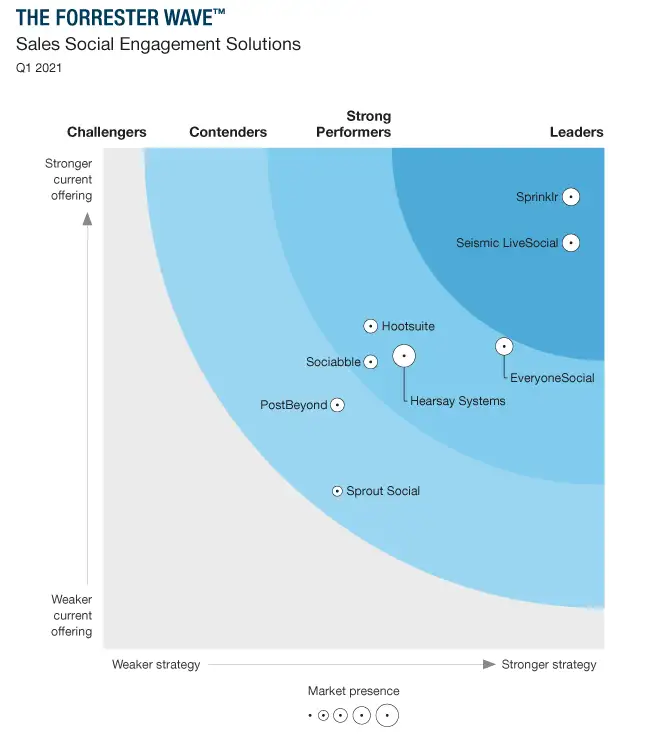Unify your marketing and advertising teams. Save costs by up to 50% and boost marketing ROI.
Streamline organic and paid campaign orchestration across 30+ channels with a unified AI-powered platform. Unlock higher productivity, faster go-to-market and better brand governance.

Sprinklr Spotlight: OK.ru, Russia’s Oldest Social Network
Odnoklassniki (“OK” or OK.ru) is the oldest Russian social network. The site was launched in March 2006, seven months ahead of the other primary social network in Russia, Vkontakte (“VK”). Both sites are owned by Mail.ru Group, a Russian internet company which operates internationally under My.com.
The name “Odnoklassniki” translates to “Classmates” – the social platform was originally created to connect users with old friends and classmates.
Sprinklr named a Leader in The Forrester Wave™: Social Suites, Q3 2021
Who Uses It?
How Do People Use It?
Boasting more than 200 million registered users, Odnoklassniki receives as many as 1.5 billion monthly visits. Average visit duration is an impressive 25 minutes, indicating that users are hooked on the site.
OK.ru’s features are similar to those of other social networks. Users set up a free personal profile using an email address and password. Once signed in, they can share status updates, photos, and videos. Users can personalize their profile themes by either selecting a pre-existing option or uploading one of their own.
Image belongs to author
Alongside the social networking basics, OK offers a host of other prominent features, including the ability to engage in private chats with friends and participate in discussion boards. Users can rate each other’s photos, participate in polls, and see who’s viewed their profile through the ‘Guests’ button in the navigation bar.
The overarching purpose of OK, however, is to act as a platform for staying in touch with old friends and classmates. Whether fresh out of university or the military, users can “join” their graduating class.
Image belongs to author
Image belongs to author
Adding friends and finding your school are essential parts of setting up an OK profile.
Image belongs to author
OK’s straightforward user experience helps support the network’s mission of simplifying the challenge of staying in touch.
How Are Brands Using It?
Although it trails VK in terms of popularity in Russia, OK offers brands a powerful opportunity to reach an audience that is difficult to find on other platforms: an older user base living primarily in rural areas.
One tactic that brands employ is offering polls and games for customers to check out.
Image belongs to author
The gaming element of OK is a particular focus of the platform. Edgars Strods, former head of games development at OK, has emphasized the importance of three particular traits: “quality, retention, and constant updates.” Focusing on these traits ensures that players are not easily bored of games, extending the user’s stay on brand pages in the process.
Through OK’s ads-system, myTarget, brands can segment audiences according to gender, age, geography, time of day and interests. This allows for enhanced targeting of an already niche audience.
Kinder, for example, is one of the most prominent brands on OK – the confectionary company boasts more than a million followers on the site. Branded visuals feature heavily in Kinder’s content strategy, which targets users who may have kids or younger family members.
Image belongs to author
Russian bank Sberbank has developed an app for the native OK platform that allows clients to make transfers to Sberbank bank cards using only a phone number, pay phone bills, and purchase the social network’s OK currency while signed into their Odnoklassniki account. Such integrations encourage further user activity on the site.
Key Takeaways
Because OK has a niche audience, it represents an ideal platform for brands to craft hyper-focused content. Russia is not only the largest Internet market in Europe, but it’s also the leading user of social media on the continent. And although OK may not be the biggest network in the country, it ranks highly in countries including Germany and Ukraine – both attractive markets in their own right.
While social media sites such as Facebook and X, formerly Twitter garner the bulk of attention, brands can use OK to target audiences who do not use any other social networks.
A platform of over 200 million registered users is not to be underestimated. For the brands who get it right, everything will be more than OK.


